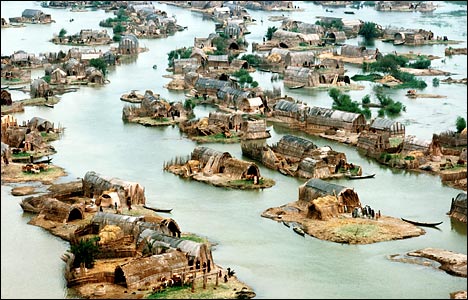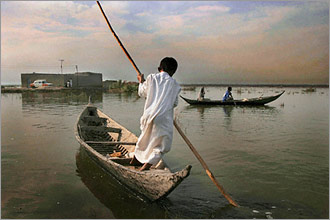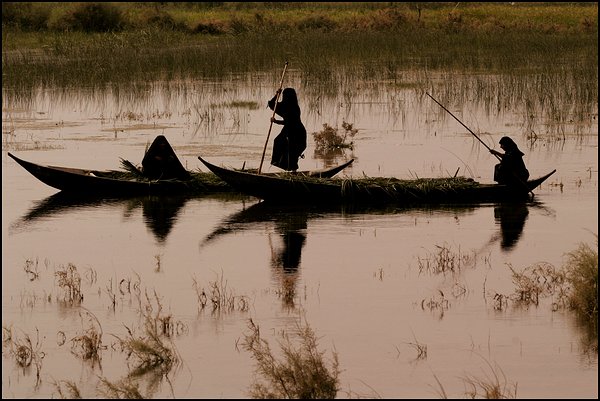The Marsh Arabs
The amazing photo above is by Nik Wheeler of marshes in the Tigris-Euphrates delta near An Nasiriyah in 1974 (more photos at the nytimes.com).
The picture feels both beautiful and desolate at the same time. These tiny chained islands, made of matted reeds, afloat in a vast marsh. Each one with a small reed house, shaped as a half-cylinder, with boats, people and buffalo scattered throughout. They think that less then 10% of the original 7,700 square miles of marsh remain, largely destroyed by Saddam's regime after the uprisings in 1991.
In looking for more pictures online, I discovered that the people who lived there were called the Madan and had lived there for 5,000 years. I also discovered that there was a man called Wilfred Thesiger who had lived with them for years and written a book called The Marsh Arabs about his experiences.
… it was the harsh existence of the Madan that attracted Wilfred Thesiger. Early in The Marsh Arabs, the reader gains some idea of how Wilfred Thesiger lived when he recounts a sheikh's son explaining that the "Madan live like their buffaloes. Their houses are half underwater, filled with mosquitos and fleas. If you try to sleep in one of them you. will probably get your face trodden on by buffaloes during the night". The scene grows even bleaker in later passages when you learn that the few strips of dry land in the deltas are inhabited by ferocious wild dogs which make it impossible to stray very far; many people get gored by wild pigs; houses catch fire with unnerving ease; and diseases like dysentery are rife.Source kruse.co.uk
Note August 2023: Having read Against the Grain by James C. Scott, I am a little more suspicious of the quoted descriptions of the Marsh Arab's living conditions.
Update October 2003: There's something about these pictures that captivates me. I can't stop staring at them.
With the fall of Saddam Hussein's regime, the marshes of southeastern Iraq have been returned to their natural state. During his presidency, Hussein had drained the wetlands to eliminate a hiding place for Shiite Muslims. Now, after engineers have re-flooded the area, the Marsh Arabs have returned home to reclaim their lives and their culture.
Source: washingtonpost.com
Loading comments...


